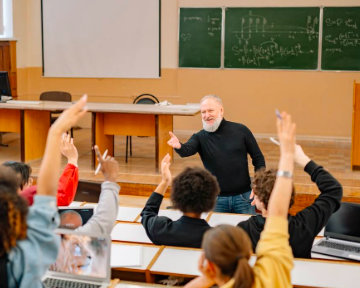Mentorship in high school academies is a powerful tool that plays a pivotal role in shaping students’ academic and personal growth. It provides students with guidance, encouragement, and connections that are crucial for their success, both during high school and beyond. Through mentorship, students gain valuable insights, develop confidence, and acquire life skills that help them navigate their academic challenges and prepare for their future careers.
One of the primary benefits of mentorship in high school academies is the personalized academic support it offers. While teachers strive to address the needs of all students, their time and resources are often limited. Mentors, however, can offer one-on-one attention and tailored guidance. This allows students to set specific academic goals, tackle difficult subjects, and get advice on course selection and test preparation. Mentors act as academic coaches, guiding students through their educational journey in a way that is personalized to their strengths, weaknesses, and ambitions. Whether it’s advice on tackling a challenging subject or assistance in refining study habits, mentors provide the support that helps students thrive academically.
Beyond academics, mentorship in high school academies is instrumental in helping students explore potential career paths. High school can be a time of great uncertainty when it comes to future goals. Students may feel overwhelmed by the pressure to make decisions about their careers and education. Mentors, especially those with experience in specific fields, provide a unique opportunity for students to gain insight into various industries and professions. This guidance helps students better understand their interests and strengths, giving them a clearer idea of what careers might align with their skills and passions. Whether students are interested in medicine, engineering, the arts, or business, mentors can provide real-world advice, share their experiences, and offer valuable networking opportunities. This exposure can help students make informed decisions about their academic pursuits and career goals, building a strong foundation for future success.
In addition to academic and career guidance, mentors offer crucial emotional and social support to high school students. High school is often a time of personal growth, and students frequently face challenges related to self-esteem, peer pressure, and navigating relationships. Many students also experience anxiety and uncertainty about their futures. Mentors provide a safe and trusted space for students to share their feelings and concerns. They offer guidance on managing stress, improving self-confidence, and developing emotional resilience. This type of emotional support helps students stay grounded, focus on their goals, and develop the coping strategies needed to navigate the challenges of high school life. A mentor’s encouragement can make a world of difference in helping a student feel understood and supported during difficult times.
Mentorship also fosters a sense of community within the high school academy. Many students, especially those in larger schools, may feel disconnected from others. Through mentorship programs, students are encouraged to connect with mentors and peers from different grade levels, promoting collaboration and mutual support. Older students can offer valuable guidance to younger students, and in turn, younger students can bring fresh perspectives. This sense of community can help break down barriers between students of different backgrounds and interests, creating a more inclusive and supportive school environment. As students engage with mentors and their peers, they develop important interpersonal skills, such as communication, empathy, and teamwork, which will serve them well in both academic and professional settings.
Furthermore, mentorship programs help students build networks that extend beyond their immediate school environment. Mentors often introduce students to professionals, alumni, or organizations in various industries, expanding their network and opening up opportunities that would otherwise be inaccessible. These connections can lead to internships, volunteer opportunities, and even job offers in the future. The relationships formed during mentorship can be lifelong, providing students with access to a broad support system as they move through their academic careers and enter the workforce.
In conclusion, mentorship is an essential element of high school academies that contributes significantly to students’ academic success, personal growth, and career readiness. Through mentorship, students receive personalized academic support, explore career options, and gain emotional support. Mentorship also promotes a sense of community, fostering collaboration and connection among students. By building meaningful mentor-mentee relationships, high school academies are helping students develop the skills and confidence they need to succeed in school and beyond. As students are guided through their academic challenges and personal journeys, mentorship programs play a critical role in shaping the leaders and professionals of tomorrow.






